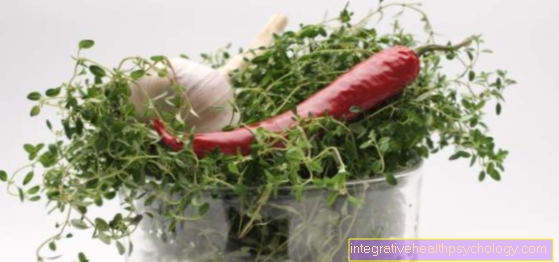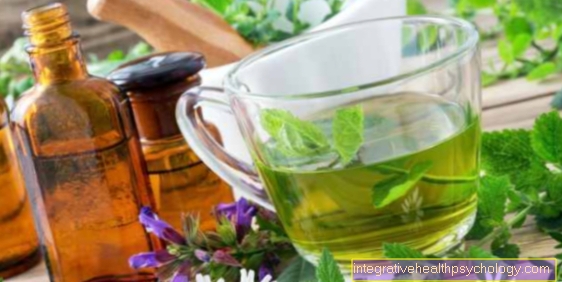Lemon balm
Synonyms in a broader sense
Vegetable synonyms: The lemon balm belongs to the lip flower family (Lamiceae family). Because of its lemony smell, it is usually called "lemon balm". In addition, one can still find names such as lemon cellar, nerve herb, lady's herb, garden balm, heart herb and lemon herb in the vernacular.
Latin name: Mellissa officinalis
The plant
The Lemon balm also called melissa officinalis, can grow up to 90 cm high. She loves sunny, sheltered places. Of their homeland are the eastern Mediterranean countries and West asia. Today, however, it is grown in Central, Western and Eastern Europe. The egg-shaped leaves of lemon balm smell and taste lemony before they bloom. The lemon balm grows as perennial herb with upright, branched, almost bare stems. The stalked notched, serrated leaves on the edge, are arranged crossed opposite. The small, white to yellowish lip flowers sit in pseudo whorls in the leaf axils of the upper leaves. The Heyday the balm is from June to August. To medical use but come only the leaves and shoot tips before flowering, because the flower negatively affects the taste and smell of the lemon balm plant.
Summary
The lemon balm, also known as lemon balm because of its lemony taste, is an herbaceous plant that was brought to Spain by the Arabs from the eastern Mediterranean in the 11th century. Their attraction to bees was noticed early on. Today it is mostly a garden plant. It is grown in cultures for medicinal purposes. But it is also very popular in the kitchen for desserts and drinks because of its lemon flavor. The undemanding plant can be planted very well in your own garden or on the balcony. Only the young shoot tips and leaves before the flowering period are used. Ingredients include essential oils.
Manufacturing
The fresh or dried leaves of lemon balm, which are collected before flowering, are used medicinally. The essential oil of the lemon balm leaves is used externally in creams, gels or bath additives.
Characteristic ingredients of lemon balm are flavanoids, essential oil, coffee acid compounds and rosmarinic acid. It also contains tannins and bitter substances.
The ingredients of lemon balm can be found in many finished medicinal products for restlessness, sleep disorders and gastrointestinal diseases.
Therapy / areas of application / effect
In the first place come the antispasmodic, relaxing properties the lemon balm that in the essential oils stuck. The calming effect the lemon balm on the nervous stomach cannot be overlooked. It is particularly suitable for sensitive peoplewho often have a Irritable stomach or complain of irritable bowel syndrome. The vegetative nervous system in the digestive tract is calmed and relaxed by the lemon balm. Stomach pressure, gas and malaise become alleviated. Here you can also use the lemon balm combine with peppermint.
Also at Difficulty falling asleep the lemon balm has a beneficial effect. In combination with valerian and hops, it works with restlessness and insomnia, used. The latest scientific, clinical studies have been Dementia sufferers (dementia = Poor memory in old age) treated with lemon balm. It was found that the states of restlessness improved and brain performance increased.
In clinical trials, a antiviral effect, especially at Herpes viruses, placed. The lemon balm prevents the viruses from docking on the cells.
To external application ointments are made that are used to treat Herpes infections of the skin, can be used. For the therapy to be successful, it must be applied to the skin as soon as the first symptoms appear. The so-called "cold sores" go away very quickly.
Dosage form
The lemon balm is used in folk medicine inside at Nervous disorders, stomach disorders on a nervous basis, abdominal disorders, chronic bronchial catarrh, nervous palpitations, vomiting, weak nerves, migraine, Pain and high blood pressure applied.
Outwardly will she for rheumatic complaints (rheumatism), Nerve pain and stiff neck used.
The lemon balm can be in the form of Ready-made preparations, teas, drops like lemon balm spirit and Bath additives be used.
At Tea and infusions is the Daily dose the lemon balm 2 to 3 g, at Tinctures (1: 5 in 45% Ethernol) 2-6 ml, three times a day.
For the Making tea 150 ml of boiling water are poured over five teaspoons of leaves. Cover and let stand for 10 minutes and drink as needed.
Melissa oil is used and should be used for aromatherapy only for external use come.
The cream With 1% dry extract the lemon balm (70: 1) 2-4 times a day.
Please note always the Leafletand ask your doctor. There are lemon balm extracts also as alcohol-free solutions and Capsules without a prescription in the pharmacy.
Side effect and interaction
So far, there have been no serious side effects when taking lemon balm. However, an effect of individual ingredients of lemon balm on the thyroid was found.
When treating thyroid disorders, you should definitely consult your doctor before taking lemon balm.
The use of lemon balm, in high doses, can reduce the ability to react. Be careful in traffic and when using machines!
Allergic reactions to components of lemon balm are conceivable.
Manufacturer / trade name
Manufacturers are named as examples and were selected at random. we have with none Manufacturers a personal connection!
Melissa Hofmann's spirit® N2 50ml € 3.39
Melissa Hofmann's spirit® N3 100ml € 4.94
Status: January 2004
Phytopharmaceuticals in Germany
The list of the best-selling herbal preparations led by far the ginkgo:
- ginkgo
- Johannis herbs
- Devil's claw
- Horse chestnuts
- artichoke
- Milk thistle
- Nettle
- Umckaloabo
- Hawthorn
- ivy
A list of all medicinal herbs / medicinal plants that we have already published can be found under: Medicines A-Z.





























